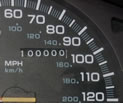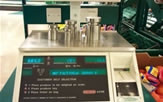Consumers Questions Answered
Scroll through our list of commonly asked queries and problems to find the correct advice: Or for more advice please click logo on the right.
- Late delivery
- Second hand cars
- Second hand car mileage
- Deposits
- Extended warranties
- Statutory rights
- Shop prices
- Shop scales and petrol pumps
- Can I get a refund?
- Local business gone bust
- Misleading prices
- Refunds on sale goods
- Holiday nightmare
- Guarantees
- Faulty goods
- Proving goods are faulty
Late Delivery
Q. I recently ordered a three-piece suite and was told delivery would be in 6 to 8 weeks time. After nine weeks it still hasn't been delivered so can I cancel the contract and get my money back?
A. Probably not at this stage. Time is not usually an element of a consumer contract unless it is specifically stated and the trader's statement of 6-8 weeks will just be a guide. However if the delay is unreasonable you may advise the trader that you are now making time of the essence and provide a reasonable date by when the furniture must be delivered. If it isn't delivered by this date the contract may then be cancellable.
Second Hand Cars

Q. I have just purchased a second hand car from the small ads of the local newspaper but after only one week the clutch has gone. Can I sue the seller for compensation as I've only just bought the car?
A. Consumers have far fewer rights when purchasing any goods from private sellers (as opposed to buying from traders). The law requires that goods sold privately only have to be as described and they do not have to meet any minimum quality standards (except vehicles must be roadworthy and not sold in a dangerous condition). Even if the vehicle was described as very good condition you would need to prove this wasn't the case at the time of the sale. The fact that the clutch has gone doesn't necessarily prove that the vehicle wasn't in good condition.
Second Hand Car Mileage

Q. I have just found out that a second hand car I bought from a dealer three months ago has done 50,000 more miles than that indicated on the cars mileage indicator. The dealer has told me it isn't his responsibility, as he didn't know the car had done the higher mileage either. What can I do?
A. As the vehicle appears to have been misdescribed the trader may have committed a criminal offence and you should report the matter to Trading Standards who will investigate the circumstances. If you have been misled by the odometer reading then depending on the amount of use you have had of the car, you may be entitled to a refund or compensation to reflect the true value of the car.
Deposits

Q. I agreed to buy a car from a local dealer last week and put down a deposit of £100. I have now decided to buy a different car from another dealer so can I have my deposit back?
A. When you agreed to buy the car you entered a legally binding contract and you will be in breach of this contract if you decide not to go ahead with the purchase. The business can keep your deposit in certain circumstances:
- To cover loss such as costs already incurred or loss of profit directly arising from your cancellation
- They must take reasonable steps to reduce their loss
- The deposit should only be a small percentage of the total price.
Extended Warranties

Q. Every time I buy a new electrical item the shop tries to sell me an extended warranty. Do I need to buy it and do I have any rights if I don't buy it and the item develops a fault?
A. Buying an extended warranty is purely at the discretion of the consumer, but the cost is often quite high compared to the cost of the item purchased. If you do wish to purchase an extended warranty it may save you money if you shop around with other retailers, insurance companies and the manufacturer of the item. If you don't buy it, you still have your normal statutory rights against the retailer of the goods and you may also be provided with a manufacturers guarantee free of charge giving you additional rights against the manufacturer.
Statutory Rights
Q. What are my statutory rights against the retailer?
A. When you buy goods from a trader, you are always entitled to get goods:
- of satisfactory quality
- fit for their purpose
- as described
If they don't comply with this at the time of sale, for a period of 30 days afterwards you can return the goods (except perishable goods with a short life span) and claim a refund, repair or replacement. If you choose a repair or replacement the ‘clock stops’ and you retain your right to a full refund for the remainder of the 30 days (or a further 7 days, whichever is the longer) to check if the repair or replacement is successful.
If you have lost the right to reject the goods you can still claim a repair or replacement. Faults can become apparent sometime after sale (a latent fault), or an item may not be durable at the time of sale, but this would not be apparent until it breaks down months later. These faults could still be considered to be present at the time of sale. It is up to you to show the goods had been faulty when you purchased them unless you request a repair or replacement and return them within 6 months in which case it is for the trader to show the goods were of satisfactory quality at the time of the sale.
See the business companion guide for a more comprehensive answer.
Shop Prices
Q. My local supermarket never prices its bread and I'm sure they charge me a different amount every time I go in. What can I do about it?
A. The law requires that all goods, including food, being offered for sale to consumers should be clearly price marked so you know what you have to pay for goods. Report this to your local Trading Standards Service who will investigate and advise the shop on the legal requirements.
Shop Scales and Petrol Pumps

Q. I'm sure my local supermarket scales are wrong as when I get home I always check my fruit and vegetables on my kitchen scales and it always seems less than the weight on my receipt. On top of this the last time I went there I filled up with fuel at their petrol station and it cost me 5 more than it usually does to fill my tank! How can all this be checked?
A. Every Trading Standards Service has Trading Standards Officers (also known as Inspectors of Weights & Measures) who can visit the trader and ensure the in-store scales and petrol pumps comply with stringent accuracy requirements. If the scales and petrol pumps are not accurate they have to be withdrawn from use until adjusted and re-checked.
Can I get a refund?

Q. I bought a new coat recently but it doesn't fit me. I took it back to the trader who didn't have my size so he offered me a credit note. Can I insist on a refund instead?
A. The simple answer is no, unless, when the coat was purchased the trader agreed that you would be able to return it for a refund if it didn't fit - this would then become a term of the contract.
Generally consumers can only insist on a refund / exchange if the goods are not:
- of a satisfactory quality
- fit for their purpose
- as described
Consumers are not entitled to take goods back if the goods don't fit, they have changed their mind about it or they are unwanted birthday presents.
Many businesses do have returns policies, but this is strictly at their discretion. So as you are legally not entitled to anything from the trader it would be best to accept the credit note.
Local Business Gone Bust
Q. I had a contract with a local business for them to build an extension on my house and have paid a deposit of £500 by credit card. The business has now gone bust so am I entitled to my deposit back?
A. If a limited company owes you the money you can register as a creditor with the appointed liquidators who will be administering the company's debts, however it cannot be guaranteed that you will receive the money owed to you. If the business is not a limited company but a private individual or partnership then the person(s) running the business are still liable to you even if they have stopped trading.
If the business is a Limited Liability Partnership (LLP) its liability is limited in a similar way as if it were a limited company. If it goes out of business you may not be able to recover any money it owes you if it has no assets.
However for any payment over £100 which is made on a credit card (not a charge or debit card) the provisions of Section 75 of the Consumer Credit Act 1974 apply and the credit card company is equally liable with the trader. You should therefore contact your credit card company and explain the situation and that you wish to make a claim against them.
Even if you clear your credit card every month, or have the cash in your bank account, its worth considering purchasing expensive goods on a credit card so that you have the additional protection if the business goes bust or there is a breach of contract (e.g. the goods are faulty or don't arrive).
Misleading Prices
Q. When I went to buy a television the price in the shop was 50 higher than the price advertised in the local newspaper. Can I go back and insist they sell it to me at the lower price?
A. No. Consumers cannot insist that any trader sells them goods at any particular price. A trader may refuse to sell anything to anyone. However it is an offence for traders to give misleading price indications like this and you should report it to your local Trading Standards service.
No Refunds
Q. I recently returned a faulty toaster that I bought in a half price sale, but the shop wouldn't give me a refund and pointed to a sign stating No Refunds on Sale Goods. Should I now return it to the manufacturer under the guarantee?
A. Consumers' rights apply to sale goods as much as full price goods and so if there was a fault with the toaster at the time of the sale then you would be entitled to a refund from the retailer. Signs such as this, which attempt to restrict consumers' rights, are null and void and cannot be relied upon by the trader. They are also illegal and you should report this to your local Trading Standards Service.
Your rights against the manufacturer are in addition to any rights against the retailer and are limited to the terms of the guarantee.
Holiday Nightmare

Q. My recent holiday turned out to be a nightmare. The hotel was in the middle of a building site, the swimming pool was filthy, and the nightly entertainment schedule had been cancelled. How do I claim compensation?
A. You should be able to expect that a holiday reaches a reasonable standard and that any brochure descriptions are not false or misleading. Failure by the Tour Operator to comply with this may entitle you to compensation.
It is important that you complain to the company's representative in the resort as soon as possible. They may be able to resolve some of the problems or if the matter is severe move you to another hotel.
If you wish to take the complaint further you must follow the terms and conditions as stated in the brochure for making a complaint. This usually means completing a complaint form in the resort and making another written complaint when you return from the holiday.
Any claim you make against the Tour Operator is more likely to succeed if you have good evidence of what occurred. This may include photographic or video evidence and you should also obtain names and addresses of other people who had the same experiences as you who will be able to corroborate your claims.
A brochure that misdescribes a hotel or holiday may also be in breach of criminal legislation so you should report this matter to Trading Standards.
Guarantees
Q. With all the legislation protecting consumers doesn't everything I buy have to come with a guarantee?
A. No. There is no legal requirement for a retailer or manufacturer to give consumers a guarantee and you shouldn't assume a product is covered by a guarantee without checking. However if a guarantee is provided, new legislation requires the guarantee to be written in a plain and intelligible way, in English, and it must set out the terms of the guarantee and the claims procedure. Further to this if a guarantee is indicated as being included, it must be made available to the consumer to examine, on request (this must be in writing or other durable form).
Faulty Goods
Q. When I recently returned a faulty kettle the shop manager told me that there was new legislation that said that I must now accept a repair or replacement instead of getting a refund. Is this right?
A. If the product is returned within a reasonable period and the kettle obviously had or was developing the fault when you bought it then you are still entitled to a full refund from the trader. However, new legislation gives consumers extra rights that could allow you to insist on an exchange or repair if you prefer (and if it is reasonable for the trader to do this).
Proving Goods are Faulty
Q. A television I bought three months ago has developed a fault but the shop I bought it from has said I need to prove the television is faulty before they do anything about it. What can I do?
A. Prior to 31 March 2003, if you had to take court action against the trader you would certainly have to prove the television was faulty by getting an expert to examine it for you. Now however, if you pursue certain remedies, any faults occurring within the first 6 months are assumed to be present at the time of sale. This means you are entitled to a repair or replacement unless the trader can prove to the satisfaction of the court that the goods were satisfactory at the time of sale.
